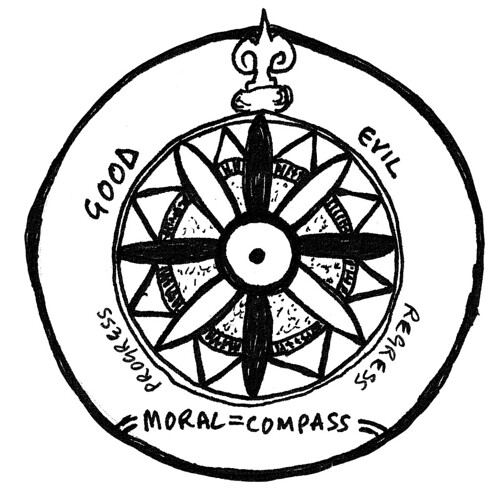
Moral Compass by psd
I wanted to write a quick post to follow-up last week's discussion on the GMC consultation on Good Medical Practice. Several doctors commented that they were concerned that the line which said that they should act "at all times" in a manner that would not reduce trust in themselves or other doctors left them open to possible persecution over lifestyle choices.
For example Ditzy wrote:
"Most of us are up in arms over the ambiguity of what activities, in their private lives, the GMC felt was appropriate for them to regulate. A one off drunken dancing on the tables at the village pub? An affair with a married person? Multiple sexual partners? Frequenting the bookmakers? Falling out of nightclubs every Friday night? There simply is no guidance and any of these actions could, potentially, be said to bring the doctor and the profession into disrepute although none of them are illegal. "
I decided to go back and find out what the reaction was to the introduction of this clause in to the 2006 version of Good Medical Practice. The results of the official consultation are available here. This includes feedback from doctors and the wider public on the 2005 draft document (which unfortunately I can not locate). They note that:
"While honesty and trustworthiness within the doctor-patient relationship are perceived as important by the public, most people no longer appear to expect doctors to demonstrate moral excellence in all aspects of their lives, and it is widely recognised that they are ‘only human’. Some doctors also felt that expectations of probity, as set out in the draft document, are no longer appropriate."
So the GMC recognised in 2006 that the public did not expect 'moral excellence' of doctors.
But when the guidance was published it was reported in the Guardian, by Sarah Bosely, as being a "tougher ethical code". Why was this? Jane O'Brien, Head of Standards and Ethics for the GMC, is reported as saying that the GMC had been criticised for not giving clear enough guidance to doctors in the past, for example, about how long after a professional relationship ends would it be appropriate to start a sexual relationship with a patient. But Good Medical Practice was not intended to be a rule-book.
"The guidance encourages doctors to think through their behaviour, and is not a set of rigid rules by which they can be judged - which may leave the GMC open to criticism. "We don't think there is a way of making guidance that would provide that absolute boundary," Ms O'Brien said."
An article by the writer Dea Birkett in the Health Services journal, commenting on the 2005 draft policy was very clear that she did not want to know what doctors got up to when they were not at work. Her suspicion was that the guidance had been updated to make it more 'politically correct'.
But what has the reality been? Are doctors being sanctioned for legal sexual activity that might be frowned upon by the public? I haven't reviewed all the Fitness to Practice procedures which are published on the GMC website but there are some accounts in the press. A trainee anaesthetist was suspended for 9 months after accessing (legal) hardcore porn on a hospital computer. Another doctor who had an 'inappropriate' relationship with a patient for several years, and who was cautioned for kerb-crawling, was not suspended.
In the past year, 43 doctors were referred to a GMC hearing for 'indecent behaviour' but the outcomes are not described. Having reviewed some fitness to practice proceedings it seems likely that these are serious events such as the sexual assault of patients. It seems that it would be very unlikely that having an affair would be deemed 'indecent behaviour'.
In summary, when the current version of Good Medical Practice was introduced there were concerns from the doctors and public that it would involve holding doctors to an exceptional moral standard. However, there is no evidence that doctors are being reprimanded for the types of behaviour which Ditzy has raised in her comment.
Does this reassure anyone?
No comments:
Post a Comment